IT’S ALL IN YOUR HEAD –
Aug. 24, 2023 – “One of the biggest challenges for patients with addiction is preventing relapse,” Ma said. “We know they need medication, community involvement, psychological support and other resources to help, but for many people who go back to take a drug, it just feels like an automatic behavior. If we can understand whether addiction behavior is subconscious or conscious behavior, we can find better ways to treat and prevent addiction and relapse.”
The supplementary motor cortex is typically known for directing how the body moves, so Ma said the finding that it plays a big role in addiction is novel and exciting.
“This brain region has never really gotten too much attention in addiction research, so we’re excited about this finding and how it can change the way we treat addiction by using less invasive methods, such as transcranial magnetic stimulation, as well as the trajectory of our work moving forward,” Ma said.
In the future, the team will study the effect of other addictive substances to see if the supplementary motor cortex is involved in other types of drug use disorders, such as opioid and alcohol use disorders.
The first author of the study, Donald Huang, was Ma’s PhD student. Huang recently received his PhD in Medical Neuroscience from IU School of Medicine and now works as a postdoctoral researcher at the University of Chicago.
About Indiana University School of Medicine
IU School of Medicine is the largest medical school in the U.S. and is annually ranked among the top medical schools in the nation by U.S. News & World Report. The school offers high-quality medical education, access to leading medical research and rich campus life in nine Indiana cities, including rural and urban locations consistently recognized for livability.



